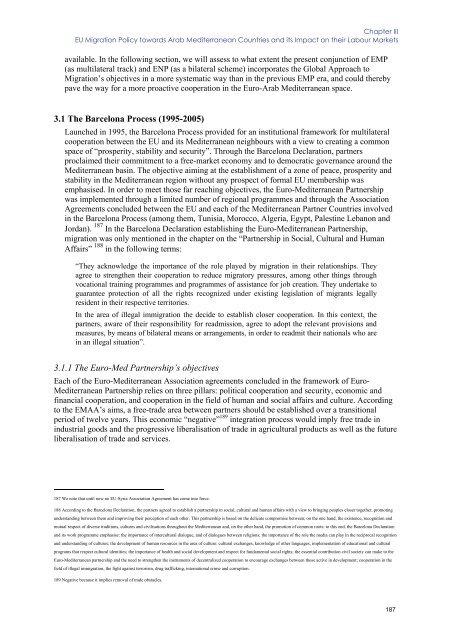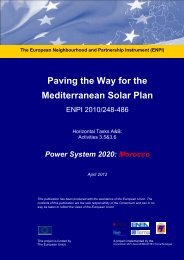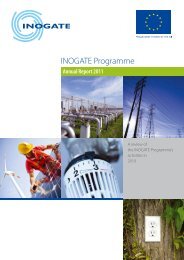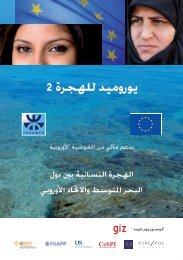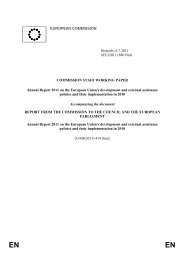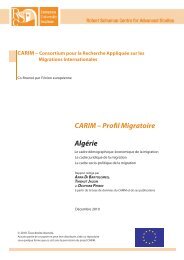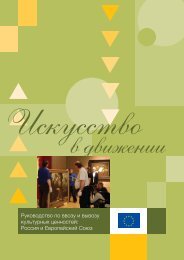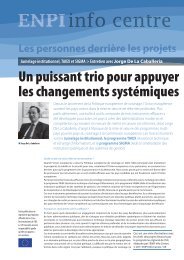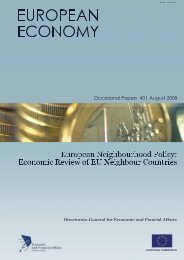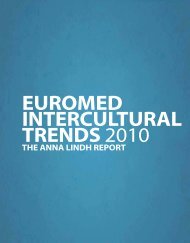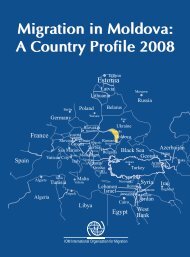<strong>European</strong> CommissionOccasional Paper 60, Volume IThe causes of under-assimilation are, however, not easy to tackle. Integration policies in the hostcountry such as language courses <strong>and</strong> training courses have had a very limited effect. Probablymore binding programmes have to be envisaged such as linguistic tests for a permanent residencypermit <strong>and</strong> training courses. The selection of migrants will reduce cases of under-assimilation <strong>and</strong>remains one of the few options available in this field. But as under-economic assimilationfrequently means under-social assimilation, the selection of migrants does not insure against socialexclusion, which is affected by income level <strong>and</strong> by the education level of workers.It is important to stress that policies used to reduce the number of under-assimilated foreigners, <strong>and</strong>the incentive return policies for the unemployed have already shown their inefficiency asunemployed migrants do not go back home. If host countries are keen on revising their <strong>migration</strong>policies so as to reduce the number of permanent migrants but not the number of workers, asolution is to combine more temporary <strong>migration</strong> schemes which insure a return on human capitalto the origin country with more efficient integration policies optimising the long-term migrant’sintegration in the host country.After having studied how <strong>and</strong> to what extent highly-skilled <strong>migration</strong>, temporary circular-<strong>migration</strong>schemes, <strong>and</strong> integration policies could empower the promoted Global Approach to Migration in theEuro-Arab Mediterranean Framework, we will now look more closely at the Euro-Mediterraneanframework <strong>and</strong> the <strong>European</strong> Neighborhood Policy, <strong>and</strong> evaluate whether they are adequateinstruments capable of refining the Global Approach to Migration <strong>and</strong> the EU’s external <strong>migration</strong>policy at both bilateral <strong>and</strong> regional levels in the Euro-Arab Mediterranean migratory <strong>and</strong> economicspace.3. The Euro-Mediterranean framework <strong>and</strong> the <strong>European</strong> Neighborhood Policy:Adequate tools for an external <strong>migration</strong> policy?The need for “a comprehensive approach to <strong>migration</strong> addressing political, human rights <strong>and</strong>development issues in countries <strong>and</strong> regions of origin <strong>and</strong> transit” was already stressed in the Tampere<strong>European</strong> Council’s conclusions (1999). Thus, the latter emphasizes that “this requires combatingpoverty, improving living conditions <strong>and</strong> job opportunities, preventing conflicts <strong>and</strong> consolidatingdemocratic states <strong>and</strong> ensuring respect for human rights, in particular rights of minorities, women <strong>and</strong>children”. In many respects, those general objectives, considered as causes of undesirable im<strong>migration</strong>to the EU, match the Euro-Mediterranean Partnership’s (EMP) declared aims.However, paradoxically, the consideration of <strong>migration</strong> issues both in the Barcelona Declaration<strong>and</strong> in the Euro-Mediterranean Association Agreements (EMAAs) between the EU <strong>and</strong>Mediterranean Partner Countries was quite limited, except in the field of non-discrimination withregard to legally residing migrant workers (see Appendix). Whereas, in the most recent EMAAs,cooperation in the field of illegal <strong>migration</strong> is stressed (this is particularly clear in the EMAA withAlgeria), <strong>migration</strong> remains part of a social dialogue to be held between partners with no particularincentives, <strong>and</strong> not of the economic cooperation. Only in the last few years, after the Summitmarking the first ten years of the Euro-Mediterranean Partnership (1995-2005), have <strong>migration</strong>issues come to the fore in Euro-Mediterranean co-operation, with a new pillar of cooperation inJustice <strong>and</strong> Home Affairs.The <strong>European</strong> Neighbourhood Policy launched in 2003 raised new expectations in the Euro-Mediterranean context, as a result of which new cooperation methods <strong>and</strong> funds have been made185 It means that the more talented go back <strong>and</strong> the less qualified remain. Migration literature has usually assumed that migrants are positively selected, namely that the best move. Still thisdoes not necessarily mean that the more educated move. For a given level of observable characteristics, the unobservable variables which positively effect the wage equation affectspositively too the probability of leaving. This is the case in Italy <strong>and</strong> Germany (Venturini Villosio 2008, Massey Constance 2003) <strong>and</strong> is one of the explanation of the lower assimilation.186 Even after controlling for language, human capital, years since <strong>migration</strong> <strong>and</strong> the economic cycle a national fixed effect remain which probably leads back to the social capital of themigrants or to a form of discrimination – be that discrimination open or otherwise.186
Chapter IIIEU Migration Policy towards Arab Mediterranean Countries <strong>and</strong> its Impact on their <strong>Labour</strong> Marketsavailable. In the following section, we will assess to what extent the present conjunction of EMP(as multilateral track) <strong>and</strong> ENP (as a bilateral scheme) incorporates the Global Approach toMigration’s objectives in a more systematic way than in the previous EMP era, <strong>and</strong> could therebypave the way for a more proactive cooperation in the Euro-Arab Mediterranean space.3.1 The Barcelona Process (1995-2005)Launched in 1995, the Barcelona Process provided for an institutional framework for multilateralcooperation between the EU <strong>and</strong> its Mediterranean neighbours with a view to creating a commonspace of “prosperity, stability <strong>and</strong> security”. Through the Barcelona Declaration, partnersproclaimed their commitment to a free-<strong>market</strong> economy <strong>and</strong> to democratic governance around theMediterranean basin. The objective aiming at the establishment of a zone of peace, prosperity <strong>and</strong>stability in the Mediterranean region without any prospect of formal EU membership wasemphasised. In order to meet those far reaching objectives, the Euro-Mediterranean Partnershipwas implemented through a limited number of regional programmes <strong>and</strong> through the AssociationAgreements concluded between the EU <strong>and</strong> each of the Mediterranean Partner Countries involvedin the Barcelona Process (among them, Tunisia, Morocco, Algeria, Egypt, Palestine Lebanon <strong>and</strong>Jordan). 187 In the Barcelona Declaration establishing the Euro-Mediterranean Partnership,<strong>migration</strong> was only mentioned in the chapter on the “Partnership in Social, Cultural <strong>and</strong> HumanAffairs” 188 in the following terms:“They acknowledge the importance of the role played by <strong>migration</strong> in their relationships. Theyagree to strengthen their cooperation to reduce migratory pressures, among other things throughvocational training programmes <strong>and</strong> programmes of assistance for job creation. They undertake toguarantee protection of all the rights recognized under existing legislation of migrants legallyresident in their respective territories.In the area of illegal im<strong>migration</strong> the decide to establish closer cooperation. In this context, thepartners, aware of their responsibility for readmission, agree to adopt the relevant provisions <strong>and</strong>measures, by means of bilateral means or arrangements, in order to readmit their nationals who arein an illegal situation”.3.1.1 The Euro-Med Partnership’s objectivesEach of the Euro-Mediterranean Association agreements concluded in the framework of Euro-Mediterranean Partnership relies on three pillars: political cooperation <strong>and</strong> security, economic <strong>and</strong>financial cooperation, <strong>and</strong> cooperation in the field of human <strong>and</strong> social affairs <strong>and</strong> culture. Accordingto the EMAA’s aims, a free-trade area between partners should be established over a transitionalperiod of twelve years. This economic “negative” 189 integration process would imply free trade inindustrial goods <strong>and</strong> the progressive liberalisation of trade in agricultural products as well as the futureliberalisation of trade <strong>and</strong> services.187 We note that until now no EU-Syria Association Agreement has come into force.188 According to the Barcelona Declaration, the partners agreed to establish a partnership in social, cultural <strong>and</strong> human affairs with a view to bringing peoples closer together, promotingunderst<strong>and</strong>ing between them <strong>and</strong> improving their perception of each other. This partnership is based on the delicate compromise between, on the one h<strong>and</strong>, the existence, recognition <strong>and</strong>mutual respect of diverse traditions, cultures <strong>and</strong> civilisations throughout the Mediterranean <strong>and</strong>, on the other h<strong>and</strong>, the promotion of common roots: to this end, the Barcelona Declaration<strong>and</strong> its work programme emphasise: the importance of intercultural dialogue, <strong>and</strong> of dialogues between religions; the importance of the role the media can play in the reciprocal recognition<strong>and</strong> underst<strong>and</strong>ing of cultures; the development of human resources in the area of culture: cultural exchanges, knowledge of other languages, implementation of educational <strong>and</strong> culturalprograms that respect cultural identities; the importance of health <strong>and</strong> social development <strong>and</strong> respect for fundamental social rights; the essential contribution civil society can make to theEuro-Mediterranean partnership <strong>and</strong> the need to strengthen the instruments of decentralized cooperation to encourage exchanges between those active in development; cooperation in thefield of illegal im<strong>migration</strong>, the fight against terrorism, drug trafficking, international crime <strong>and</strong> corruption.189 Negative because it implies removal of trade obstacles.187
- Page 5 and 6:
STUDYLABOUR MARKETS PERFORMANCE AND
- Page 7 and 8:
Table of ContentsLABOUR MARKETS PER
- Page 10:
8.1 Actual migration and consumptio
- Page 15 and 16:
Chapter IFinal Report 15 MILLION NE
- Page 17 and 18:
Chapter IFinal Report …so that MI
- Page 19 and 20:
Chapter IFinal Reportroots). The cu
- Page 21 and 22:
Chapter IFinal Report In AMCs, REMI
- Page 23 and 24:
Chapter IFinal Reportpolicies. This
- Page 25 and 26:
Chapter IFinal ReportMediterranean
- Page 27 and 28:
Chapter IFinal ReportMore recently,
- Page 29 and 30:
Chapter IFinal Reportfor EU employm
- Page 31 and 32:
Chapter IFinal Reportchosen, these
- Page 33 and 34:
Chapter IFinal Reportexit of women
- Page 35 and 36:
Chapter IFinal ReportFigure 1.2.1.
- Page 37 and 38:
Chapter IFinal ReportA Declining Em
- Page 39 and 40:
Chapter IFinal ReportThe same year,
- Page 41 and 42:
Chapter IFinal ReportTable 2.2.1. I
- Page 43 and 44:
Chapter IFinal Reportminimum wages
- Page 45 and 46:
Chapter IFinal Report2.4 Unemployme
- Page 47 and 48:
Chapter IFinal ReportYouth Unemploy
- Page 49 and 50:
Chapter IFinal ReportBut one should
- Page 51 and 52:
Chapter IFinal Reportmillion) 10 .
- Page 53 and 54:
Chapter IFinal Reportmight intensif
- Page 55 and 56:
Chapter IFinal Reporttrue labour ma
- Page 57 and 58:
Chapter IFinal Reportto reform the
- Page 59 and 60:
Chapter IFinal ReportFrom a differe
- Page 61 and 62:
Chapter IFinal ReportTable 4.2.1 Ou
- Page 63 and 64:
Chapter IFinal ReportSource: Adams
- Page 65 and 66:
Chapter IFinal Reportin the destina
- Page 67 and 68:
Chapter IFinal ReportIn conclusion,
- Page 69 and 70:
Chapter IFinal Reportorganised in B
- Page 71 and 72:
Chapter IFinal Reportsecond Intifad
- Page 73 and 74:
Chapter IFinal Reportstands at 29.7
- Page 75 and 76:
Chapter IFinal Reportconstruction w
- Page 77 and 78:
Chapter IFinal ReportAs far as the
- Page 79 and 80:
Chapter IFinal Reportother cases, l
- Page 81 and 82:
Chapter IFinal Reportunemployment a
- Page 83 and 84:
Chapter IFinal Reportof Egypt, so f
- Page 85 and 86:
Chapter IFinal ReportWhile progress
- Page 87 and 88:
Chapter IFinal ReportThese reservat
- Page 89 and 90:
Chapter IFinal ReportAs Figure 6.3.
- Page 91 and 92:
Chapter IFinal Reportin skill devel
- Page 93 and 94:
Chapter IFinal ReportThe Directive
- Page 95 and 96:
Chapter IFinal ReportThe need for
- Page 97 and 98:
Chapter IFinal Reportobjectives are
- Page 99 and 100:
Chapter IFinal Reporttrue Euro-Medi
- Page 101 and 102:
Chapter IFinal Report- Putting empl
- Page 103 and 104:
Chapter IFinal Report promotion of
- Page 105 and 106:
Chapter IFinal ReportOtherADAMS, R.
- Page 107 and 108:
Chapter IFinal ReportDE BEL-AIR, F.
- Page 109 and 110:
Chapter IFinal ReportGUPTA, S., C.
- Page 111 and 112:
Chapter IFinal ReportOECD (2000): M
- Page 113 and 114:
Chapter II - Thematic Background Pa
- Page 115 and 116:
Chapter IIThe impact of migration o
- Page 117 and 118:
Chapter IIThe impact of migration o
- Page 119 and 120:
Chapter IIThe impact of migration o
- Page 121 and 122:
Chapter IIThe impact of migration o
- Page 123 and 124:
Chapter IIThe impact of migration o
- Page 125 and 126:
Chapter IIThe impact of migration o
- Page 127 and 128:
Chapter IIThe impact of migration o
- Page 129 and 130:
Chapter IIThe impact of migration o
- Page 131 and 132:
Chapter IIThe impact of migration o
- Page 133 and 134:
Chapter IIThe impact of migration o
- Page 135 and 136:
Chapter IIThe impact of migration o
- Page 137 and 138: Chapter IIThe impact of migration o
- Page 139 and 140: Chapter IIThe impact of migration o
- Page 141 and 142: Chapter IIThe impact of migration o
- Page 143 and 144: Chapter IIThe impact of migration o
- Page 145 and 146: Chapter IIThe impact of migration o
- Page 147 and 148: Chapter IIThe impact of migration o
- Page 149 and 150: Chapter IIThe impact of migration o
- Page 151 and 152: Chapter IIThe impact of migration o
- Page 153 and 154: Chapter IIThe impact of migration o
- Page 155 and 156: Chapter IIThe impact of migration o
- Page 157 and 158: Chapter IIThe impact of migration o
- Page 159 and 160: Chapter IIThe impact of migration o
- Page 161 and 162: Chapter III - Thematic Background P
- Page 163 and 164: Chapter IIIEU Migration Policy towa
- Page 165 and 166: Chapter IIIEU Migration Policy towa
- Page 167 and 168: Chapter IIIEU Migration Policy towa
- Page 169 and 170: Chapter IIIEU Migration Policy towa
- Page 171 and 172: Chapter IIIEU Migration Policy towa
- Page 173 and 174: Chapter IIIEU Migration Policy towa
- Page 175 and 176: Chapter IIIEU Migration Policy towa
- Page 177 and 178: Chapter IIIEU Migration Policy towa
- Page 179 and 180: Chapter IIIEU Migration Policy towa
- Page 181 and 182: Chapter IIIEU Migration Policy towa
- Page 183 and 184: Chapter IIIEU Migration Policy towa
- Page 185 and 186: Chapter IIIEU Migration Policy towa
- Page 187: Chapter IIIEU Migration Policy towa
- Page 191 and 192: Chapter IIIEU Migration Policy towa
- Page 193 and 194: Chapter IIIEU Migration Policy towa
- Page 195 and 196: Chapter IIIEU Migration Policy towa
- Page 197 and 198: Chapter IIIEU Migration Policy towa
- Page 199 and 200: Chapter IIIEU Migration Policy towa
- Page 201 and 202: Chapter IIIEU Migration Policy towa
- Page 203 and 204: Chapter IIIEU Migration Policy towa
- Page 205 and 206: Chapter IIIEU Migration Policy towa
- Page 207: Chapter IIIEU Migration Policy towa


